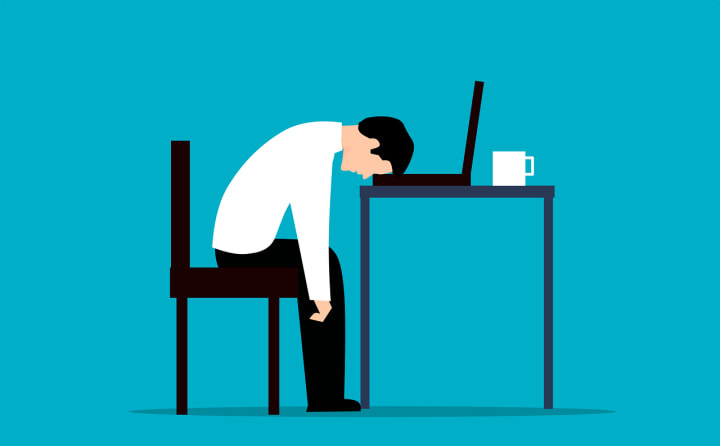Mental Stress in Modern World
Introduction

Introduction:
Mental stress is a growing concern in the modern world, due to the fast pace of change, demanding work and life, and constant exposure to negative news and information. It can manifest as anxiety, depression, burnout, sleep problems, etc. Mental stress can lead to impaired thinking, decreased productivity, and physical health problems.

To manage mental stress, individuals should prioritize self-care, seek support, and develop coping strategies such as mindfulness, exercise, and healthy habits. A comprehensive and holistic approach is necessary to address this issue and promote mental health and well-being in society.
Mental Stress before 10 years:
Mental health was a topic that was not widely discussed or understood 10 years ago, compared to today. There was a significant stigma attached to mental health issues, and many people felt ashamed or embarrassed to talk about their experiences. Mental health was often seen as a personal weakness or a character flaw, rather than a legitimate medical condition.
Access to mental health services was also limited, and many people did not have access to the care and support they needed. Mental health was often viewed as a low priority by governments and healthcare organizations, and funding for mental health services was limited.
In many communities, mental health was not considered to be a priority, and people often lacked basic knowledge about common mental health conditions, such as depression and anxiety. Mental health education was limited, and many people did not have access to the resources and information they needed to understand and manage their mental health.
Reasons for the Stress:
There are many reasons why stress levels have increased in recent years.

Some of the most common factors include:
- Busy and Demanding Lifestyles: The fast pace of modern life, long working hours, and the pressure to perform can all contribute to high levels of stress.
- Financial Worries: Economic uncertainty, job insecurity, and the increasing cost of living can cause financial stress and worry.
- Technology and Social Media: The constant exposure to information and stimulation through technology and social media can lead to feelings of overwhelm and burnout.
- Political and Social Tension: Political and social tensions, such as divisive political discourse and social injustice, can contribute to feelings of stress and anxiety.
- Health Concerns: Health issues, both personal and those affecting loved ones, can cause significant stress and worry.
- Work-Related Stress: The pressure to succeed and perform at work, along with long hours and job insecurity, can all contribute to high levels of stress.
- Family and Relationship Problems: Family and relationship issues, such as caring for loved ones, can cause significant stress and emotional strain.
These are just some examples of the many factors that can contribute to increased stress levels in the modern world. It's important for individuals to be aware of the factors that affect their stress levels and to take proactive steps to manage their mental health and well-being.
How Technology involves Mental stress:
Technology has both positive and negative effects on stress levels. On one hand, technology can provide access to information, resources, and tools that can help individuals to manage stress and improve their mental health. On the other hand, technology can also be a source of stress, particularly when it is overused or not used in a balanced way.

Some of the ways that technology can affect stress levels include:
- 24/7 Connectivity: The constant availability of technology, such as smartphones and laptops, can lead to feelings of overwhelm and burnout, as well as interfere with sleep and other important activities.
- Social Media Pressure: The pressure to maintain a perfect image and presence on social media can cause stress and anxiety, as well as contribute to feelings of loneliness and low self-esteem.
- Information Overload: The constant exposure to information, news, and stimulation through technology can lead to feelings of stress and anxiety, as well as information overload.
- Video Gaming: Excessive video gaming can lead to feelings of stress, as well as interfere with sleep and other important activities.
- Virtual Meetings: Virtual meetings and remote work, while convenient, can also be a source of stress, particularly when they add to the demands of a busy lifestyle.
- Exercise: Physical activity, such as walking, running, or yoga, can help to relieve stress, improve mood, and promote relaxation.
- Mindfulness and Meditation: Practicing mindfulness and meditation can help to calm the mind, reduce stress, and improve mental well-being.
- Healthy Eating: Eating a balanced diet, rich in nutrients and antioxidants, can help to support mental health and reduce stress levels.
- Sleep: Getting enough quality sleep is essential for mental health and well-being. Poor sleep can exacerbate stress and anxiety.
- Social Support: Spending time with family and friends, or participating in social activities, can help to relieve stress and promote feelings of well-being.
- Hobbies and Interests: Engaging in enjoyable activities, such as reading, painting, or gardening, can help to relieve stress and improve mental well-being.
- Time Management: Effective time management can help to reduce stress and promote balance in life.
- Seeking Professional Help: If stress becomes overwhelming, it's important to seek help from a mental health professional.
How to get relief from stress:
There are many ways to relieve stress and promote mental health and well-being. Some of the most effective strategies include:
It's important to find the strategies that work best for you and to make self-care and stress management a priority in your life. Remember, everyone experiences stress differently and what works for one person may not work for another.
Live a Stress-free life:

A stress-free life can bring many benefits for both physical and mental well-being, including:
- Improved Mental Health: When stress is reduced, mental health can improve, and symptoms of depression, anxiety, and other mental health conditions can be reduced or relieved.
- Better Physical Health: Chronic stress has been linked to a range of physical health problems, including heart disease, digestive problems, and chronic pain. Reducing stress can improve physical health and reduce the risk of these conditions.
- Increased Energy and Productivity: When stress is reduced, energy levels can increase, leading to improved productivity and performance in work and daily life.
- Better Sleep: Stress can interfere with sleep, leading to fatigue and sleep disturbances. A stress-free life can promote better sleep and improved energy levels.
- Improved Relationships: Chronic stress can interfere with relationships and lead to conflict, misunderstandings, and emotional distance. A stress-free life can improve relationships and promote greater intimacy and connection.
- Increased Happiness and Satisfaction: When stress is reduced, individuals can experience greater feelings of happiness and satisfaction, as well as a sense of control over their lives.
- Improved Immune Function: Chronic stress can weaken the immune system and make individuals more susceptible to illness and disease. A stress-free life can improve immune function and reduce the risk of illness.
Conclusion:
In conclusion, a stress-free life is a goal that is worth striving for, as it can bring numerous benefits to both physical and mental health. By managing stress through effective coping strategies, regular exercise, and a healthy diet, individuals can reduce the impact of stress on their lives and improve their overall well-being. Additionally, it is important to prioritize self-care and relaxation, and to make time for activities that bring joy and fulfillment. With a combination of stress management strategies and a commitment to self-care, individuals can experience the many benefits of a stress-free life and live a happier, healthier life.





Comments
There are no comments for this story
Be the first to respond and start the conversation.